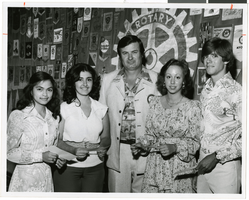Search the Special Collections and Archives Portal
Search Results
#68533: UNLV's Black Mountain Institute sponsors "Is Moderation Possible in American Politics?" panel featuring (on stage from left) Juan Williams, Kathleen Parker, Norman J. Ornstein and was moderated by Patricia Cunningham in the Stan Fulton Building March 22, 2012 at the University of Nevada, Las Vegas, 2012 March 22
Level of Description
File
Archival Collection
University of Nevada, Las Vegas Creative Services Records (2010s)
To request this item in person:
Collection Number: PH-00388-05
Collection Name: University of Nevada, Las Vegas Creative Services Records (2010s)
Box/Folder: Digital File 00
Collection Name: University of Nevada, Las Vegas Creative Services Records (2010s)
Box/Folder: Digital File 00
Archival Component
Restaurants Les îles sion, Congrès Modial de la Fédération Internationale de Confréries Bachiques, menu, 1993 May 22
Level of Description
File
Archival Collection
UNLV University Libraries Menu Collection
To request this item in person:
Collection Number: MS-00436
Collection Name: UNLV University Libraries Menu Collection
Box/Folder: Box 150
Collection Name: UNLV University Libraries Menu Collection
Box/Folder: Box 150
Archival Component
Contention Findings: Skull Valley Band of Goshute Indians and the Proposed Interim High-Level Radioactive Waste Storage, 1998 April 22
Level of Description
File
Archival Collection
Yucca Mountain Environmental Safety Reports Collection
To request this item in person:
Collection Number: MS-00786
Collection Name: Yucca Mountain Environmental Safety Reports Collection
Box/Folder: Box 23
Collection Name: Yucca Mountain Environmental Safety Reports Collection
Box/Folder: Box 23
Archival Component
#66834: Barrick Lecture - VIP Reception (Ralston, Jon; Borger, Gloria; Dionne Jr, E.J; Watts, J.C.), 2009 January 22
Level of Description
File
Archival Collection
University of Nevada, Las Vegas Creative Services Records (2000s)
To request this item in person:
Collection Number: PH-00388-04
Collection Name: University of Nevada, Las Vegas Creative Services Records (2000s)
Box/Folder: N/A
Collection Name: University of Nevada, Las Vegas Creative Services Records (2000s)
Box/Folder: N/A
Archival Component
The Outlaw invoices for film trailer prints from Consolidated Film Industries, 1974 February 22 to 1974 February 26
Level of Description
File
Archival Collection
Howard Hughes Film Production Records
To request this item in person:
Collection Number: MS-01036
Collection Name: Howard Hughes Film Production Records
Box/Folder: Box 542 (Restrictions apply)
Collection Name: Howard Hughes Film Production Records
Box/Folder: Box 542 (Restrictions apply)
Archival Component
Seattle trip. Includes folder with Program-USAF 24th Operations Analysis Symposium, HWC remarks and alliances, 1966 July 22
Level of Description
File
Archival Collection
Howard Cannon Papers
To request this item in person:
Collection Number: MS-00002
Collection Name: Howard Cannon Papers
Box/Folder: Box 04 (Trips)
Collection Name: Howard Cannon Papers
Box/Folder: Box 04 (Trips)
Archival Component

Photograph of Las Vegas, Nevada Rotary scholarship winners with Rotarian Dave Wells, Las Vegas, Nevada, September 22, 1976
Date
1976-09-22
Archival Collection
Description
Rotary scholarship winners with Dave Wells (center), President of Las Vegas Rotary Club. L-R: Rebecca Marzan, Valley High School; Linda Magnus, Gorman High School; Wells; Becky Tilley, Chaparral High; James Deakin, Las Vegas High School.
Image
#67015: Lewis, Robbiannce (Student); Daul, Jean-Luc (Exec Pastry Chef) at Four Seasons for Poster Series, 2009 April 22
Level of Description
File
Archival Collection
University of Nevada, Las Vegas Creative Services Records (2000s)
To request this item in person:
Collection Number: PH-00388-04
Collection Name: University of Nevada, Las Vegas Creative Services Records (2000s)
Box/Folder: N/A
Collection Name: University of Nevada, Las Vegas Creative Services Records (2000s)
Box/Folder: N/A
Archival Component
Construction of magnesite conveyor tunnel from unloading station to silos, neutralization and foundry areas in background: photographic print, 1942 July 22
Level of Description
Item
Archival Collection
Basic Magnesium, Inc. (BMI) Records and Photographs
To request this item in person:
Collection Number: MS-00126
Collection Name: Basic Magnesium, Inc. (BMI) Records and Photographs
Box/Folder: Box 05
Collection Name: Basic Magnesium, Inc. (BMI) Records and Photographs
Box/Folder: Box 05
Archival Component
Pagination
Refine my results
Content Type
Creator or Contributor
Subject
Archival Collection
Digital Project
Resource Type
Year
Material Type
Place
Language
Records Classification

